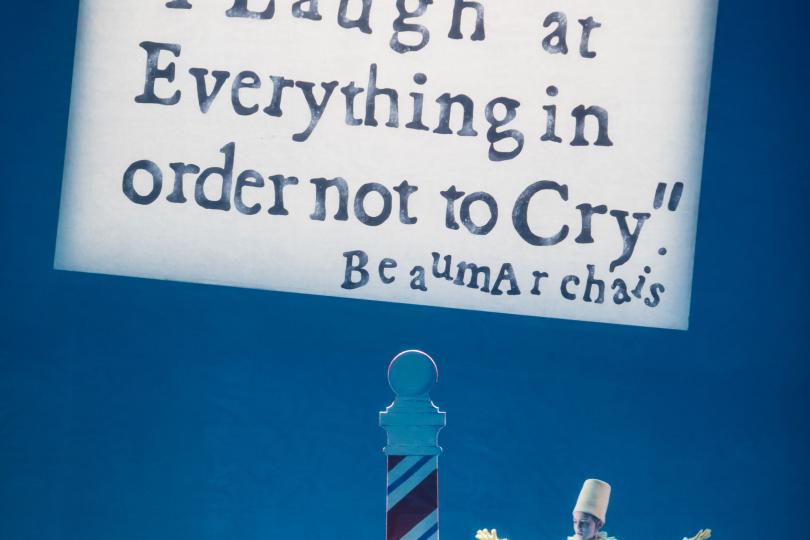It’ll make you laugh, but should it?

The Barber of Seville is well known for a variety of reasons. It’s the opera Bugs Bunny antagonizes Elmer Fudd in with in the “Rabbit Of Seville.” It’s the opera famous for having people yell “Figaro” over and over again. It’s a classic. Minnesota Opera delivers the show you expect and somewhat know under the guise of a “rom-com’. A rom-com may make the show more approachable, but this attempt is a double-edged sword. While it allows for laughs in the short term, it makes the performance as a whole feel slighted.
The story is simple enough: Rosina (Daniela Mack), the ward of the greedy Bartolo (Patrick Carfizzi), is in love with a man she believes is poor student named Lindoro. In reality, Lindoro is the wealthy Count Almaviva (Alek Shrader) who has been pretending to be someone else so he may find true love. Encumbered by Bartolo, Almaviva goes to the very popular barber Figaro (Rodion Pogossov) for assistance. This propels the opera into a madcap story featuring bribery, mistaken identity, and so much more.
Under the direction of Francesca Zambello, the opera creates laughs in the very obvious love story. In this sense, The Barber of Seville becomes a rom-com. The jokes and japes of the jestering male chorus and Figaro do play well, but the gags feel like a meal when they should have been a garnish. As you laugh you miss the diminished sense of urgency, darkness, and conniving inherent to this opera. Told this way, the story normalizes the notion that Bartolo is in the right when it comes to marrying Rosina and keeping her from someone she loves. And the only way to stick it to this old man is by playing this weird game of cat and mouse. This is a noticeable tonal shift that doesn’t take away from the performance but does leave the audience with a different feeling of catharsis. Whether you think this is a good or bad thing depends on how you feel about rom-coms.
Regardless of that feeling, one thing is certain: the singers were fantastic. Pogossov’s Figaro is sharp, direct, and enigmatic. His comedic timing was on point and his vocalization was even better. Mack also delighted with the skill that only a true powerhouse mezzo-soprano can. Her performance gave Rosina the authority she deserves. Thanks to Mack’s dedicated work, Rosina became less of a damsel in distress, and instead embodied a rather amorous trickster.
Special recognition must be given to both Lynly A. Saunder and Heidi Spesard-Noble. In each of their ways they helped enhance the humor in the show, and nowhere is this clearer than in their work in the male chorus. Saunders’ costuming easily set the tone for the period while creating a blank slate for the actors to build off of. The use of placards as costumes for the police was hysterical. The use of cut-outs was also enhanced by the choreography of Spesard-Noble. Her formations created laughs and cemented the idea that Figaro was the man the audience should know to love.
The Barber of Seville is a name people know to love. Minnesota Opera takes this name and places it in a different light that may irk you depending on what you want from a night at the opera. Regardless of how you feel about the tone, the music and choreography will take you away to someplace special.




